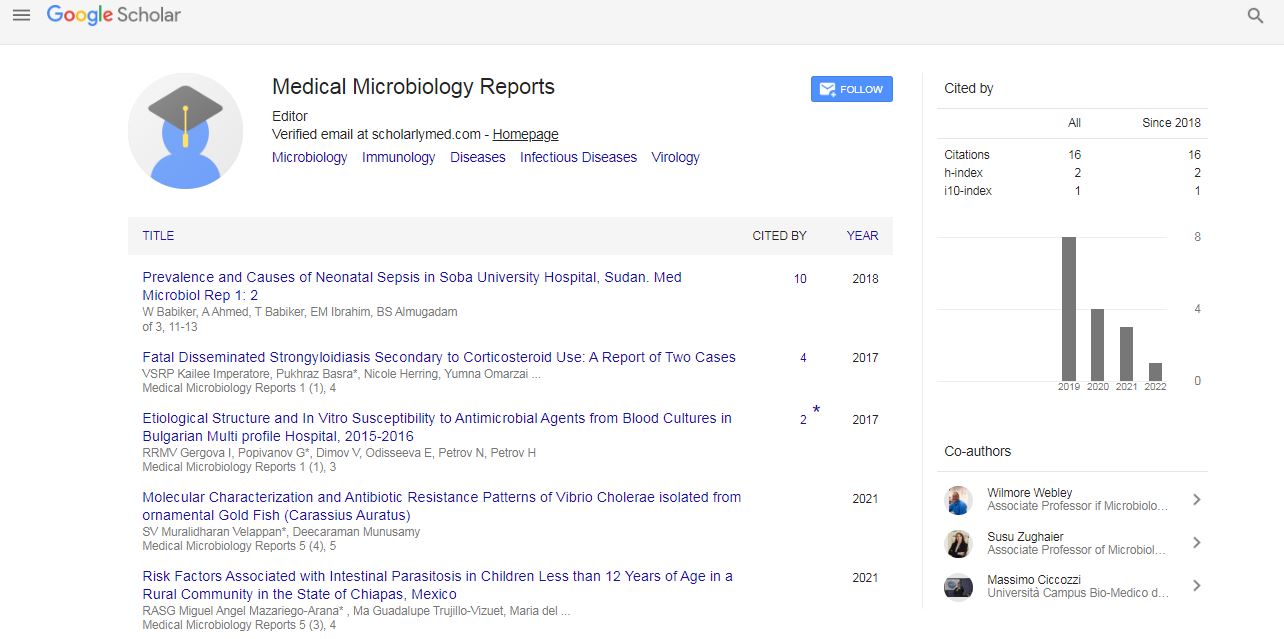Perspective, Med Microbiol Rep Vol: 7 Issue: 1
Microbial Cultures for Scientific Research
Mitchell Fennell*Department of Forest Resources Management, University of British Columbia,Vancouver, Canada
*Corresponding Author: Fennell Mitche
Department of Forest Resources
Management
University of British Columbia, Vancouver, Canada
E-mail: mitchfenllk@mail.ubc.ca
Received date: 27 February, 2023, Manuscript No. MMR-23-96427;
Editor assigned date: 01 March, 2023, PreQC No. MMR-23-96427(PQ);
Reviewed date: 15 March, 2023, QC No. MMR-23-96427;
Revised date: 22 March 2023, Manuscript No. MMR-23-96427(R);
Published date: 31 March 2023 DOI: 10.4172/MMR.1000333
Citation: Fennell M (2023) Microbial Cultures for Scientific Research.Med Microbiol Rep 7:1.
Description
Microbial cultures are a fundamental tool in microbiology research, allowing scientists to study and understand the diverse world of microorganisms. Microbes playes an important various environmental, industrial, and medical processes, and microbial cultures provide an avenue for isolating, identifying, and characterizing these microscopic organisms. In this manuscript, the significance of microbial cultures in scientific research, their applications, and challenges, as well as best practices for establishing and maintaining microbial cultures. Microbes including bacteria, fungi, viruses, and protozoa, represent an immense diversity of microorganisms that inhabit virtually every corner of the Earth. They play pivotal roles in global biogeochemical cycles, environmental sustainability, and human health. However, their study requires their isolation and characterization, which is made possible through microbial cultures. Microbial cultures are defined as the process of growing microorganisms in a controlled environment with a defined set of nutrients, temperature, and other conditions, which facilitate their growth and reproduction.
Significance of microbial cultures
Microbial cultures are indispensable tools in scientific research due to their versatility and applications. They are used to isolate and identify new microbial species, study microbial physiology and metabolism, investigate the role of microbes in environmental processes, develop microbial-based technologies, and produce valuable biomolecules through biotechnology. Microbial cultures are also important in medical research for studying pathogenic microbes, testing the efficacy of antimicrobial agents, and developing vaccines and other therapies.
Applications of microbial cultures
Microbial cultures find applications in various fields, including environmental microbiology, industrial microbiology, agricultural microbiology, medical microbiology, and biotechnology. In environmental microbiology, microbial cultures are used to isolate and study microorganisms involved in bioremediation, nutrient cycling, and decomposition of organic matter. In industrial microbiology, microbial cultures are used to produce enzymes, biofuels, and other valuable products. In agricultural microbiology, microbial cultures are used for biocontrol of plant diseases, enhancing plant growth, and improving soil fertility. In medical microbiology, microbial cultures are used to identify and test the sensitivity of pathogenic microbes to antibiotics, and in the development of vaccines and other medical interventions. In biotechnology, microbial cultures are used for genetic engineering, production of recombinant proteins, and other applications.
Challenges in microbial cultures
Establishing and maintaining microbial cultures can be challenging due to several factors. Contamination from other microorganisms can affect the purity of the culture and lead to inaccurate results. Variation in growth requirements among different microorganisms can require specific culture conditions, making it necessary to optimize growth media and environmental conditions for each microbe. Some microorganisms are fastidious, requiring complex or expensive growth media, which can add to the cost and complexity of microbial culture. Slow-growing microorganisms may take weeks or even months to grow, requiring patience and careful monitoring. Additionally, some microbes are difficult to culture, especially those that are not yet fully understood or have not been previously cultured. Establishing and maintaining microbial cultures requires careful attention to detail and adherence to best practices. Some key considerations include maintaining sterility during culture preparation, using appropriate growth media and conditions specific to the microorganism being cultured, and regular monitoring of cultures for contamination, and documenting culture characteristics, growth patterns, and other observations. It is essential to use pure cultures for research purposes to avoid confounding results due to contamination. Proper storage techniques, such as cryopreservation or freeze-drying, should be employed for long-term preservation of microbial cultures. Additionally, maintaining a culture collection, such as a microbial culture bank or a culture library, can provide a valuable resource.
 Spanish
Spanish  Chinese
Chinese  Russian
Russian  German
German  French
French  Japanese
Japanese  Portuguese
Portuguese  Hindi
Hindi 
